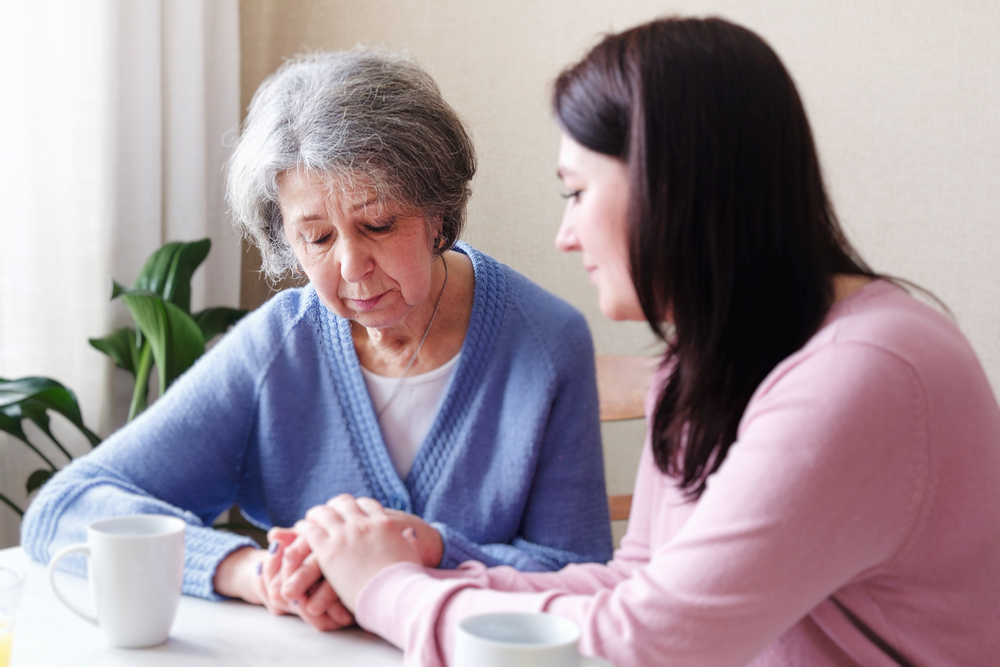 April 2, 2025
April 2, 2025
When we think about our aging loved ones, we often overlook how stressful the current changes in their lives can be. While stress affects everyone, seniors experience it differently due to health changes, loss of independence, and shifting social connections—all while possibly belonging to generations where mental health discussions were uncommon.
As the ones in charge of decision-making for our seniors, we must show them love and support during the more challenging parts of aging. Sitting down with our loved ones to create a stress-management plan shows them that we still want them to feel as though they have autonomy in their everyday lives.
To make an informed plan, you will need to know what causes stress and how much each stressor affects your senior.
Five Common Stressors in Seniors
Many stressors are unique to seniors. Often, these stressors pile up and cause a more significant stress response, detrimental to their overall mental well-being. These stressors include health challenges, financial concerns, social isolation, loss of purpose, and family dynamics.
- Health Challenges
As they age, seniors might find themselves handling more health concerns than anticipated. Chronic conditions such as arthritis, diabetes, heart disease, and osteoporosis become more prevalent. They can also affect all areas of your loved one’s life, from increased meds and doctor visits to a decline in overall wellness.
Not only that, physical limitations that come with age can also be equally stressful and frustrating. Either of these concerns can lead to the fear of losing independence, which can create a significant amount of distress and affect their mental wellness.
- Financial Concerns
In the past, retirees often worried about income once they stopped working. With social security under threat in the past few years, that concern has become even more stressful for seniors. Even worse, seniors might’ve been saving money for their retirement years for the entirety of their working life, but with inflation, that money no longer goes as far as it once did.
- Social Isolation
One unfortunate side effect of getting older is social isolation. Once seniors retire, they often find themselves alone, and they usually lack the means to stay involved. Seniors who end up with conditions that leave them homebound are most likely to have this particular stressor in their lives.
Also, consider that losing a spouse or close friend can make this isolation feel even more heavy. It’s hard enough losing independence, social opportunities, and physical abilities. Add to that the grief of losing people who matter the most, and you have a tremendous amount of stress on your loved one’s shoulders.
- Loss of Purpose
Think about your life. How much of who you are do you attribute to your career? Many seniors have spent many decades being attributed to a particular job title or identity. When that goes away, they’re likely to become depressed due to the undue stress that this shift creates.
- Family Dynamics
Finally, a common stressor that comes into play when thinking about stress management and senior care is the role family plays in a senior’s life. Seniors want to hold onto as much autonomy as possible. Therefore, they might not react well to suggestions regarding caregiver support or adapt well to new physical limitations. This can all create discord between a parent and their grown child/children, which only adds to an already stressful situation.
Assessing Your Senior’s Stress Levels
Before you can even think about discussing a stress-management plan with your senior loved one, you must know where they stand regarding stress. This is something that shouldn’t be assessed once and then forgotten. You’ll need to regularly check in with them about stressors since life changes happen all the time.
There are many signs to look out for when you are trying to determine if your loved one is stressed beyond their capacity. Some stress is normal and healthy, but too much of it will cause your loved one to display concerning signs.
Signs of Stress to Look Out For in Seniors:
- Changes in their sleep pattern (insomnia or oversleeping)
- Changes in appetite or sudden weight loss or gain
- Increased frequency of illness or chronic flare-ups
- Headaches, muscle tension, or unexplained pain
- Increased irritability, agitation, or anger
- Withdrawal from usual hobbies or activities
- Changes in memory
- Increased dependency on others (clingy behavior)
- Statements relating to their lack of worth or desire to be alive
- Increased fidgeting or pacing
Creating an Effective Stress-Management Plan
Once you can properly assess how stressed your senior is, you can sit down with them and discuss a way forward. The best way to do this is to formulate a plan that addresses all your concerns and theirs into a daily routine they can handle or manage independently.
Sure, caregiver support might be necessary regardless, but the goal of creating a senior stress-management plan is to encourage your loved one to remain engaged and increase their mental wellness.
Some suggestions, but not necessarily everything you can do for your senior’s stress-management plan, are as follows.
Physical Wellness
Working with your senior, their caregiver, and their doctor to devise a fitness plan that works with their mobility is a great way to ensure your loved one stays active. Even doing as little as a few yoga poses a day is enough to release endorphins into their bodies and increase their ability to see the positives in their lives.
Another suggestion for physical wellness is working with your senior to plan nutritious meals to keep their body and mind healthy and increase their energy levels. This suggestion goes hand in hand with creating a sleep schedule that works best for them. Each senior is unique in what these two suggestions mean for them, so communication with their doctor while planning is a great idea.
Social and Mental Wellness
These two needs go together because one feeds the other. Preventing social isolation with your senior will do wonders for how positively they feel about their life. Even if your loved one has limited mobility, these social solutions are adaptable.
The biggest way you can help your senior is by engaging them about local groups and activities they can participate in and gaining more companions. If they aren’t able to go somewhere in person, finding online hobbies or support groups can have the same effect. Ultimately, the goal is to ensure your loved one doesn’t feel alone in their new reality and has activities to keep their mind engaged.
Supporting Your Loved One
A stress-management plan can help ease both your and your loved one’s mind. As you start your journey toward stress relief, reach out to others who are involved in your loved one’s life. This isn’t something you have to tackle on your own. Especially if your senior’s changing life status has caused a strain between you.
Accessible is always ready to help guide families through this critical process. Our caregiver support includes helping family members make health-related plans and decisions regarding their loved ones. Let us help you. Contact Accessible today.


